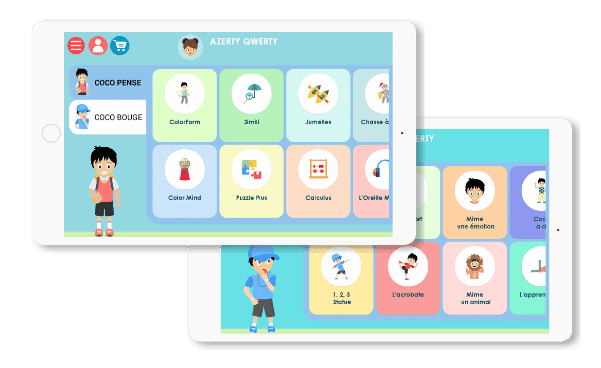Since the advent of new technologies, screens have become omnipresent in our daily lives. Children, in particular, are exposed to a variety of screens, from televisions to smartphones to tablets to computers. While these screens may offer many benefits, it is also important to consider whether they have negative effects on children’s development, especially their creativity.
In this article, we will explore the potential effects of screens on children’s creativity and look at ways to support children’s creative development while minimizing the negative effects of screens and then talk about tips for parents and children affected by screen use.
How can screens affect children’s creativity?
Screens can have a negative impact on children’s creativity in several ways. First, most screen-based activities are often very structured and do not leave much room for imagination and creative exploration. Video games, for example, often have strict rules and defined goals, which doesn’t leave much room for children’s creativity. In addition, most screens are passive media, which means that children are often spectators rather than actors. This can lead to a loss of motivation to explore, try new things and take creative risks.
In addition, excessive screen use can also affect language and communication development, which can also have a negative impact on creativity. Verbal interactions with parents, peers, and teachers are essential for children’s language and communication development. When children spend a lot of time in front of screens, they have fewer opportunities to interact verbally with others, which can cause delays in language and communication development. This can affect their ability to communicate their ideas and engage in creative conversations with other children.
A concrete example of the impact of screens on children’s creativity is their ability to solve problems creatively. Children who spend a lot of time in front of screens often have less hands-on experience and free time to explore and discover new things, which can affect their ability to find creative solutions to problems. For example, a child who spends a lot of time playing video games may not have as much time to explore nature, draw, or create things with his or her hands, which can affect his or her ability to find creative solutions to problems that are not related to video games.
In conclusion, screens can have a negative impact on children’s creativity by limiting their ability to explore, imagine and take creative risks. Parents and educators should be aware of these potential effects and work to minimize children’s exposure to screens and encourage creative and exploratory activities that support children’s creative development.
What are some tips for parents on how to encourage their children’s creativity away from screens?
Screens are an inexhaustible source of information and entertainment for children, but they can also limit their creativity. It is therefore important for parents to find ways to encourage their children’s creativity away from screens. Here are some practical tips to help you do just that.
Free spaces for play and exploration
Children need space to explore, create and imagine. Parents can encourage this by providing craft materials such as paper, pencils, paint, fabric and tools to build things. Parents can also create dedicated play areas in the home where children can let their imaginations run wild.
Encourage reading
Parents can encourage their children to read and tell stories. Reading helps to develop imagination and stimulate creativity. Parents can give their children interesting and fun books that will help them explore new worlds and ideas. Parents can also encourage their children to create their own stories by asking them to tell stories aloud or by giving them journals or notebooks to write their stories in.
Practice creative activities
Children can do creative activities such as dance, music or drama. These activities help children express themselves and explore their emotions in a creative way. Parents can enroll their children in dance, music or drama classes or organize home performances where children can showcase their creative talents.

Explore nature and play outdoors
When children spend time outdoors, they have the opportunity to explore the natural world and let their imagination run wild. Parents can organize family nature outings, picnics or hikes to encourage their children to engage with the world around them.
So to encourage their children’s creativity away from screens, parents can provide free play spaces, encourage reading and storytelling, engage in creative activities and explore nature. These activities will help children develop their imagination and creativity while keeping them away from screens.
Why should a child be allowed to improve their creativity?
Creativity is an essential skill that allows children to adapt to their environment and solve problems in innovative ways. Creative children tend to be more confident, independent and able to think outside the box. That’s why it’s crucial to let a child improve his or her creativity from an early age.
Explore new territories
Letting a child enhance his or her creativity allows him or her to explore new territory, test new ideas and express emotions. For example, a child who plays with blocks can learn to build different shapes and structures, thus developing spatial thinking and creativity. Similarly, a child who writes stories can explore different scenarios and develop his or her imagination, understanding of narrative structure and ability to communicate complex ideas.
Develop self-esteem
Parents can also help build self-esteem and confidence. Indeed, when a child succeeds in creating something new, it reinforces his or her sense of competence and confidence in his or her abilities. In addition, when parents value their child’s creativity, it gives them recognition and a sense of pride that further builds their self-esteem.

Finally, creativity is a valuable skill for the child’s future. In an ever-changing world, employers are looking for people who can think creatively to solve complex problems. Children who have been encouraged to improve their creativity are more likely to develop these skills and succeed in their professional lives.
In conclusion, allowing a child to enhance his or her creativity is crucial to his or her future development and success. By encouraging children to explore new horizons, test new ideas and express their creativity, parents help them become more confident, self-reliant individuals who can think outside the box. Examples of children’s creativity abound, so it is important to support their creative development to enable them to succeed in their personal and professional lives.
Which children are affected by this screen use?
Excessive screen use can negatively affect the development of many children, especially those who are more vulnerable to the negative effects of screen exposure. The children most affected are often those who are younger, those with attention deficit disorder or learning disabilities, and those with a family history of mental health problems.
Infants and young children
They are particularly vulnerable to the negative effects of screen exposure. Screens can disrupt their cognitive and emotional development by disrupting their sleep, reducing their attention span and limiting their social interaction with other children. Children under 2 years of age should avoid screens altogether, while children between the ages of 2 and 5 should be limited to one hour per day of high-quality screen use, such as educational or interactive programs with parents.
Older children
They can also be affected by excessive screen use. Teens often spend many hours a day on their cell phones, computers or tablets, which can disrupt their sleep, attention span and social development. Teens who spend more time on social media may be more likely to suffer from depression and anxiety.

School-age children
There is a strong possibility that they are also affected by excessive screen use. Screens can worsen the symptoms of children with attention deficit disorder and hyperactivity, as well as children with learning disabilities. School-aged children who spend too much time in front of a screen may also lack time for physical activities, social interactions and creative hobbies.
Ultimately, all ages of children can be affected by excessive screen use, from infants to adolescents. Parents should be aware of the potential negative effects of screens on their children and work to limit their use to protect their health and development.
Discover the COCO THINKS and COCO MOVES app
The COCO THINKS and COCO MOVES app contains more than 30 educational games to work on English, math, logic, memory or attention.
In addition, the application imposes a sports break every 15 minutes of screen time to teach a measured use of screens.
Much smarter than a parental control!

Other articles that might interest you:
Supporting children with autism
Dynseo proposesSUPPORTING CHILDREN WITH AUTISM with COCO THINKS AND COCO MOVESDynseo and its team are very much...
Supporting DYS children with COCO THINKS and COCO MOVES
Dynseo proposesDYS disorders with COCO THINKS and COCO MOVESOur educational and pedagogical games program COCO THINKS...
Language development
Children communicate from birth with movements, crying, looking at each other or with smiles. After only a few months,...
Supporting children with Down Syndrome with Coco
Dynseo proposesDOWN SYNDROME with COCODown syndrome is a non-hereditary chromosomal abnormality that leads to the...
Supporting people after a stroke
Dynseo proposesStroke with CLINT, your brain training coachThe Dynseo team is very involved in helping people who have...
Supporting someone with Alzheimer’s
In this guide, we will detail how SCARLETT can be used for supporting someone with Alzheimer's. SCARLETT is a...
10 myths about the human brain you didn’t know
The brain is an incredible muscle, however there are many things we do not know, and what we do know is not always...
Using Digital Tools to Support Students with Special Educational Needs
Special Educational Needs (SEN) encompass a wide range of learning difficulties and disabilities that can hinder a...
Down Syndrome and Communication: Facilitating Interaction with Visual and Interactive Supports
When we think about Down syndrome, we often recognize it as a genetic condition that affects physical and cognitive...
How to Track Progress in People with Down Syndrome Using Digital Tools
Down syndrome, a genetic condition caused by the presence of an extra chromosome 21, affects approximately 1 in every...















